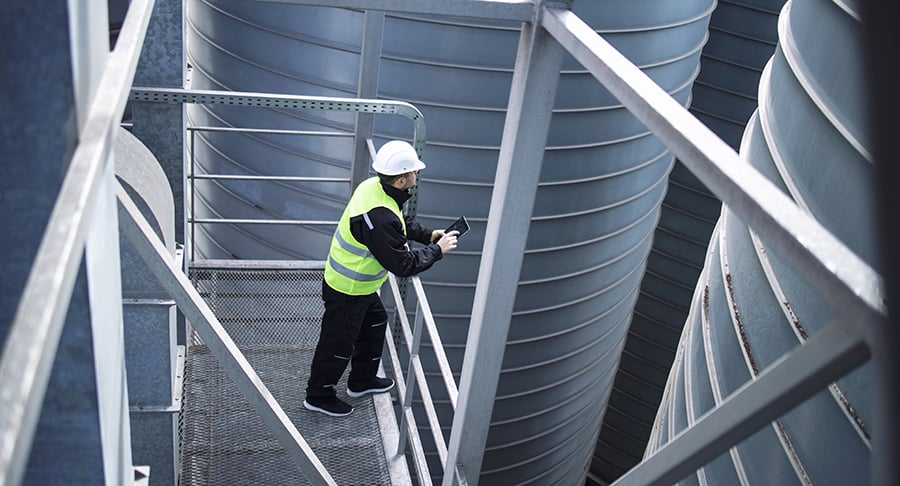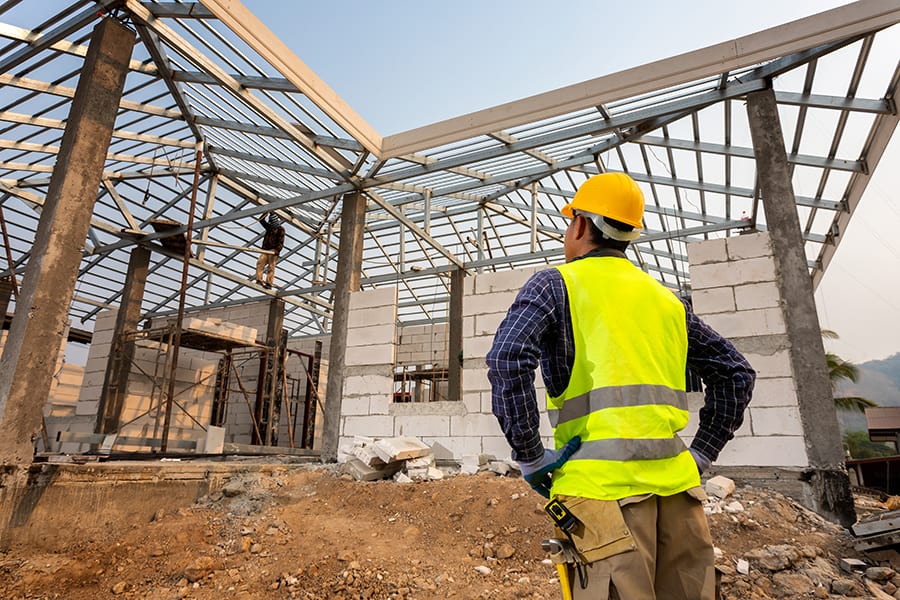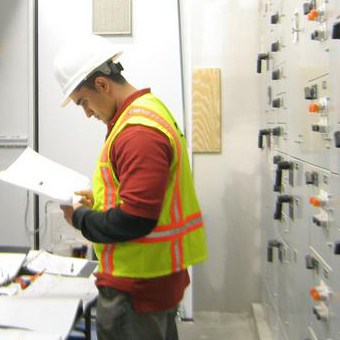A structural engineer inspection can keep your home safe and save you money. Surprisingly, many people aren’t aware of these inspections!
As a homeowner, you might think structural engineers only deal with giant bridges and towering skyscrapers. Well, surprise! They’re also the go-to pros for all sorts of structural inspections, from those massive bridges to home remodels. After all, the best design is only as amazing as the construction and upkeep.
In our discussion, we’ll answer these questions about structural home inspections:
- What’s a structural engineer inspection?
- Do you need a licensed structural engineer to do your home inspection?
- When should you call in a structural engineer?
- What’s the cost of a structural engineer inspection?
- What are the deliverables from a structural engineer for a project?
- How to find a licensed structural engineer?
Getting the answers to these questions will make sure you snag a top-notch service without skimping on quality.
What’s a structural engineer inspection?

It’s a visual once-over of a structure by a licensed structural engineer. They’ll check the structural integrity of a building or structure and make sure it’s up to snuff with all the relevant standards and codes.
For example, inside a home, the structural engineer would inspect the following:
- Beams
- Columns
- Foundation
- Framing
- Posts
- Trusses
If your home passes the inspection, you can rest easy knowing it’s safe for you and your neighbors. Plus, the engineer will give you the scoop on any potential issues and how to fix ’em.
Sometimes, the inspection sets the stage for structural modifications. Before you can modify a structure, you need to know its current condition.
Do you need a licensed structural engineer to do your home inspection?
Every human-made structure can collapse, no matter how well done the design is. A collapsing residential home can hurt or even kill a family. While a bridge collapse can put the lives of hundreds of people at risk.
To minimize risks, a licensed professional should inspect your home. It’s like going to a board-certified surgeon for an operation—you don’t want some random, unlicensed person wielding a scalpel and putting your life in danger.
Licensed engineers follow the engineering code of ethics, which puts public safety front and center in all their work. Plus, these engineers have the skills to fix any structural problems.
You can easily check a structural engineer’s license in your state. Just Google something like:
“Professional structural engineer license lookup, California”
Swap ‘California’ with your state, and you’ll land on a page like this.
When do you need a structural engineer inspection?

Here are the 8 most common times you should call in a structural engineer:
- Discovery of structural issues
- Accidental structural modifications
- Damage from natural disasters and insurance claims
- External nearby infrastructure issues
- Before and after the completion of a newly constructed structure
- Selling a home
- Buying a home
- Home remodeling
Let’s dive into each one.
#1 Discovering structural issues
As the years roll by, your home might start showing its age in the form of structural problems. If any of these red flags pop up, ring a structural engineer pronto:
- Major foundation and wall cracks
- Sagging, bowing, cracked, or sloped floors
- Ceiling cracks and loose drywall
- Foundation sinking or upheaval
- Sagging or uneven floors
- Bulging walls
- Persistent drainage issues despite new plumbing
- Doors and windows separating from walls
If caught early, you can fix these problems or at the very least control them. But if you ignore them long enough, they’ll turn into nightmare costly fixes.
#2 Accidental structural modifications
Believe it or not, contractors can accidentally modify buildings. I’ve seen it happen on projects I’ve been part of!
In one instance, a contractor was installing power feeds for EV chargers in a parking garage but accidentally bored into the wrong part of the wall. Turns out, that hole was in a crucial load-bearing pillar! In cases like this, a structural inspection is a must to ensure the building’s integrity hasn’t been compromised. After all, every structure is designed to meet specific requirements.
#3 Damage from natural disasters and insurance claims
With natural disasters like floods, hurricanes, tornadoes, fires, and earthquakes becoming more frequent, our homes’ structural integrity could be at risk. After a damaging event, it’s essential to have a structural engineer check your home to ensure it’s still safe to live in. That little crack you see might seem harmless now, but it could indicate a compromised foundation that’ll eventually lead to major issues.
Plus, a structural engineer inspection can help you get an insurance claim approved. Many insurance companies require an inspection from a licensed structural engineer.
#4 External infrastructure issues affecting surrounding areas
Mother Nature isn’t the only one causing trouble—other external factors can mess with your home, too. Take drainage issues, for instance. They can turn your life upside down, and any water-related problems can spell big trouble for your home’s structure.
A structural engineer can help mitigate potential issues with water management. At the same time, they can rescue your structure from potentially costly damage.
One other common issue is extreme temperatures. This can lead to mold, high energy bills, and ice dams. These problems won’t make your home crumble to the ground, but they’ll hurt your wallet.
#5 Inspecting new structures, from start to finish
You’d expect a brand-new construction project to be picture-perfect, right? Well, the most critical parts of a structure often remain hidden once construction wraps up—like foundations, for example.
So, it’s crucial to schedule routine inspections at different project stages. Once a foundation is in place, problems can lurk out of sight until pesky exterior cracks make an appearance. At that point, repairs become tricky and absurdly expensive.
I recommend structural inspections before pouring concrete for a foundation. This lets the inspector double-check all foundation dimensions and confirm things like rebar spacing and quantity.
And don’t forget to do one last inspection after the project is finished. This is when the inspector can assess foundation settlement and search for any cracks.
#6 Selling a home
Getting a structural inspection before putting your home on the market isn’t always top of mind, but sometimes it’s a clever move to boost your asking price—especially if you suspect a structural issue.
Think about it: any serious buyer is going to inspect your home before they seal the deal. No one wants to end up with a lemon of a house, with a $100,000 problem hidden away. Imagine a buyer’s inspector finds a series of cracks in your home’s wall, and suddenly they’re backing away, fearing a much larger issue.
But wait – you’ve got an ace up your sleeve! You whip out paperwork from a licensed structural engineer proving that those cracks are no biggie. Or maybe the paperwork shows that the cracks will cost $X,000 to fix, and you’ve already factored that into your home’s sale price.
Boom! Your buyer’s nerves are calmed, and you can sleep easy knowing you didn’t pull a fast one on anyone. Plus, your buyer will appreciate the effort you put into hiring a licensed engineer to inspect your home. This can really help you close the sale, especially in a sluggish real estate market.

Important Note: Present the buyer with all the documents from your structural engineer, along with cost estimates from contractors to fix any discovered issues.
#7 Buying a home
It’s no secret that when you buy a new home, you need an inspection. After all, for most people, a home purchase is the biggest investment they’ll make in their lives.
While most people opt for a general home inspection – which covers structural issues like cracks and sloping floors – it won’t give you an in-depth analysis of why these problems exist. That’s where a licensed structural engineer comes in. They’ll tell you the full extent of your home’s issues and the cost to fix them, helping you negotiate the price with the seller or even decide to walk away. You don’t want your dream home to turn into a nightmare.
#8 Home remodeling
Planning a major home remodel? You’re going to need a structural engineer to review your design, especially if it involves altering load-bearing parts of your home. Cities won’t issue permits without P.E. stamped drawings and calculations, so always check your local building requirements before you dive in.
For example, the County of Santa Clara’s Department of Planning Development states,
Any foundation system that deviates from the standard foundation system described in the California Residential Code shall bear the seal and signature of a registered civil or structural engineer or licensed architect and have supporting calculations to substantiate the design.
What’s the cost of a structural engineer inspection?
It’s not cheap, but it’s worth every penny when you consider what can go wrong with an unstable structure. Depending on where you live, you might be shelling out anywhere from $150 to $400 per hour. How many hours you’ll need all depends on your project’s size.
For a home remodel, a structural engineer might quote you for 6 to 10 hours. Let’s say you live in San Francisco, and they charge $350/hour. You’d be looking at a bill between $2,100 and $3,500. That could be for a project like knocking down a wall to make your living room bigger.
When requesting a quote, remember:
- The engineer will provide a cost only after fully reviewing the project scope.
- It’s common for the engineer to request a home viewing before providing a cost.
- The engineer’s cost includes their travel time and in-office engineering analysis.
- Always get several quotes, but never use a non-licensed engineer for structural work.
- Aim for a fixed cost, but expect a change order if something unexpected crops up.
- Provide the engineer with all existing home and city design plans. Request any drawings from your city before approaching the engineer.
What are the deliverables from a structural engineer for a project?
Once a structural engineer has finished their work, they’ll hand you some essential documents. You’ll get drawings, specs, and calculations to share with your city’s building department. These are officially called the project “deliverables.”
And remember, no cutting corners! Your building department needs these papers stamped by an engineer.
To give you a better idea, here’s an example of what a typical home remodel engineer does:
Structural Calculations
- Review the client’s proposed home remodel layout.
- Calculate the demand-capacity ratios (DCR’s) for attachment components and anchorage to the foundation.
- Analyze the DCR’s for the supporting foundation/slab.
- Discuss new design options with the client if the design doesn’t meet code.
Structural Drawings
- Inspect the home to collect data for the design.
- Add structural notes for seismic, wind, snow, dead, and live loads.
- Draft details of foundations and structural connections.
- Submit structural design for the client to buy and install structural materials.
- Provide construction specifications for installation.
- Provide design support and guidance.
- Respond to building department plan check comments and revise plotted sheets if needed.
How do you find a licensed structural engineer?

For home inspections, start by searching “structural engineer inspectors” plus your city’s name on Google. You’re looking for a local engineer, not someone who’ll charge you extra for travel time.
Just a heads up, big engineering firms usually don’t do residential inspections—it’s not worth their while. But if you come across one, ask if they can point you towards a smaller firm.
And don’t be shy! If you’re already working with a contractor or architect, ask them for a referral. They’re bound to know a trusty structural engineer.
Most importantly, double-check that your chosen engineer has an active P.E. license.
The structural engineer inspection wrap up
A structural engineer inspection plays a huge role in making sure the structures around us are safe and sound. Without them, I’d be sweating bullets every time I stepped into a building.
If you need one of these inspections, don’t cut corners! That’s like breaking your arm and thinking it’ll heal on its own without a doctor. Not the smartest move!
Sure, inspections might seem pricey and over the top, but they’ll let you sleep well at night, knowing your home is safe and secure.
What’s your take on structural engineer inspections? Ever had one done? If so, how’d it go, and what advice would you give to other homeowners?

Author Bio: Koosha started Engineer Calcs in 2019 to help people better understand the engineering and construction industry, and to discuss various science and engineering-related topics to make people think. He has been working in the engineering and tech industry in California for well over 15 years now and is a licensed professional electrical engineer, and also has various entrepreneurial pursuits.
Koosha has an extensive background in the design and specification of electrical systems with areas of expertise including power generation, transmission, distribution, instrumentation and controls, and water distribution and pumping as well as alternative energy (wind, solar, geothermal, and storage).
Koosha is most interested in engineering innovations, the cosmos, sports, fitness, and our history and future.

My favorite part of your blog is when you said that you must consider a local structural engineer to make sure that you won’t need to pay travel fees. I need to have our two-story house’s foundation inspected and repaired as needed on Friday. The walls of our house have e signs of cracks, and the flooring appears to be uneven. Since we have a limited budget to consider, we will do your tips.
Sounds like the perfect time to search for a structural engineer.
Treat your search as you would any other contractor though. Ask all of your questions, and thoroughly vet their history of work.
Thanks for pointing out that a licensed structural engineer checks the building’s compliance with all applicable standards and codes for the safety of the public. As you said, they also point out potential problems that need remedies. This sounds like a helpful tip because I noticed the alarming number of cracks in the basement of my house, I am planning to have my two-story house remodeled next month, so it is important for me to ensure that it is still safe place to live in.
Glad you found the info helpful.
Just be sure to vet the structural engineer you contract out – not all engineers are created equal.
I also suggest you make a punch list of all the issues in your basement to share with the engineers who inspect/bid on your project. This will better allow you to evaluate their offered services.
I like your phrase: “It’s no different than if you went to a board-certified surgeon to cut you open and operate.” I think it perfectly reflects the importance of a proper structural engineering inspection. Even a minor mistake that is missed can turn into a disaster and cause harm to people. Given this vital importance, coupled with the monotony of the audit process, the easiest way to ensure proper inspection quality is to automate to the point where the workflow becomes one continuous stream and the inspection consumes less time.
Just as an engineer must be certified, it is important that the software also has a good reputation. It must be flexible and scalable, stable and easy to use, otherwise it will have no impact on the inspection process.
So, to sum up, the main advice I can give is to make sure that the structural engineer uses good quality software, because it will actually take the performance of his work to the next level.
Nicely stated; given the routine nature of the work, you can find some engineers who simply go through the motions. Not good.
The software is often overlooked as you highlighted. You’ll find some software with such limiting operating parameters, the output becomes compromised. It’s often why for large industrial projects, the bid documents specify only X or Y software can be utilized.
If the foundation is unsafe, does the structural engineer have the ability to condemn a house?
The engineer wouldn’t condemn a home, but they should report the home to the local building department, as their duty to maintain public safety. The building official would then use the engineer’s findings in their assesment to make the final call.
The local jurisdiction/code would need to be checked on a case by case basis in a given zip code, as it’s not black and white.